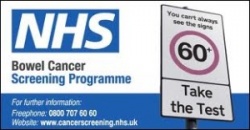'Status quo bias' affecting take up rate for bowel cancer screening
The NHS has to overcome people’s ‘status-quo bias’ if it is to increase the number of screenings for bowel cancer.

The NHS has to overcome people’s ‘status-quo bias’ if it is to increase the number of screenings for bowel cancer.
Warwick Business School’s Professor Nick Chater revealed on BBC Radio Four’s The Human Zoo that people are victims of ‘status quo bias’ - an irrational preference to maintain the current state of affairs.
This bias is very prevalent and has significant practical implications, for example, in bowel cancer screening: the very possibility of a ‘positive’ test threatens people’s psychological status quo, making it difficult for the NHS to persuade people to come forward for screening.
An experiment involving students at Warwick Business School illustrates the ‘status quo bias’. Students entering a lottery to win £5 were given the choice of swapping their named ticket to win £6, but only 50 per cent of them were willing to do it even though they had the chance of winning more money.
Professor Chater said: “That seems economically irrational - it must be better to have a chance of winning £6 than the same chance of winning £5. But if you take account of the fact that regret is very painful to us, then trying to avoid the regret of giving away what turns out to be the winning ticket is not necessarily irrational at all.
“Whenever we make a decision, we are concerned that we will look back and wished we did something else..”
This fear of a negative outcome seems to be a problem in getting older people to go for bowel cancer screening, with just 51 per cent of those eligible in Scotland taking up the screening and it is a similar picture across the UK. Yet early detection sees nine out of 10 people survive bowel cancer.
Professor Chater said: “If I was trying to persuade people to take the test I would want them to think about the physical status quo rather than their mental status quo.
“If you think about the mental status quo, a test is only likely to disturb the, perhaps complacent, mental status quo you have. If you think the physical status quo is being healthy, the test might help you get the treatment you need to stop the cancer ever happening (if pre-cancerous signs are picked up) or may help return you to health (if cancer is present).
The problem of ‘status quo bias’ afflicts many organisations or companies that are trying to implement change.
“It is everywhere.” said Professor Chater. “Whether or not to keep a ringfence on public health spending is topical at the moment. Most of us have very little idea of the absolute amount of money the government is spending on health or whether it is too little or too much. But the sense that we might reduce spending, moving away from the status quo in a negative way, is very concerning to most of us, and hence to most politicians.”
Listeners can take part in the online ‘status quo bias’ experiment by going to www.weblab.wbs.ac.uk.
14.03.2013





